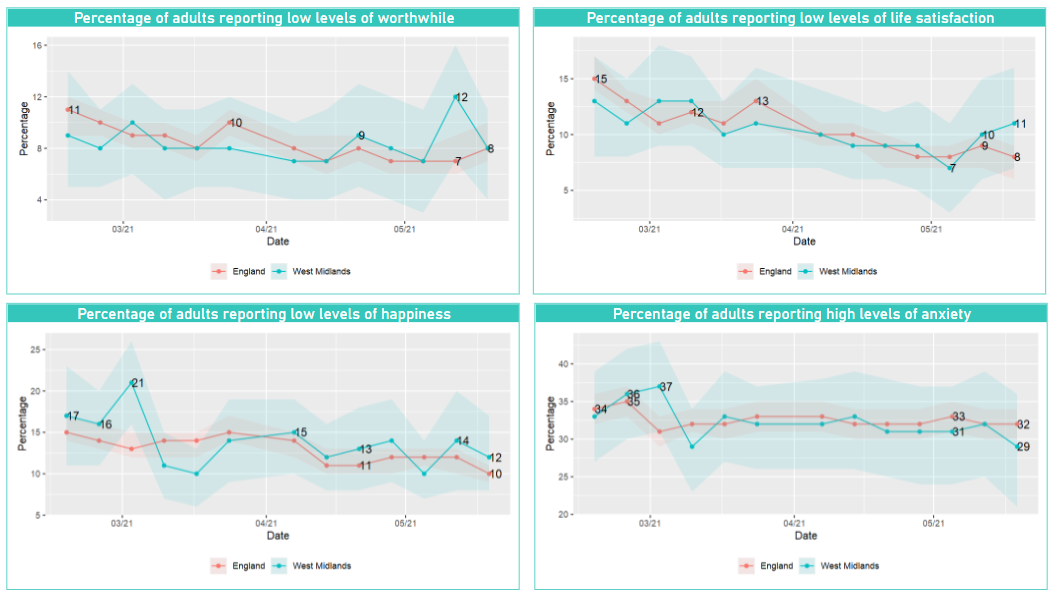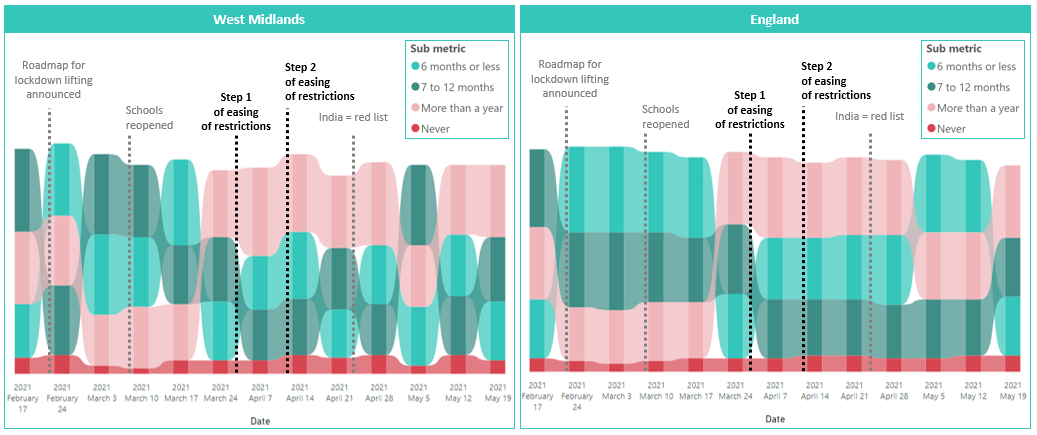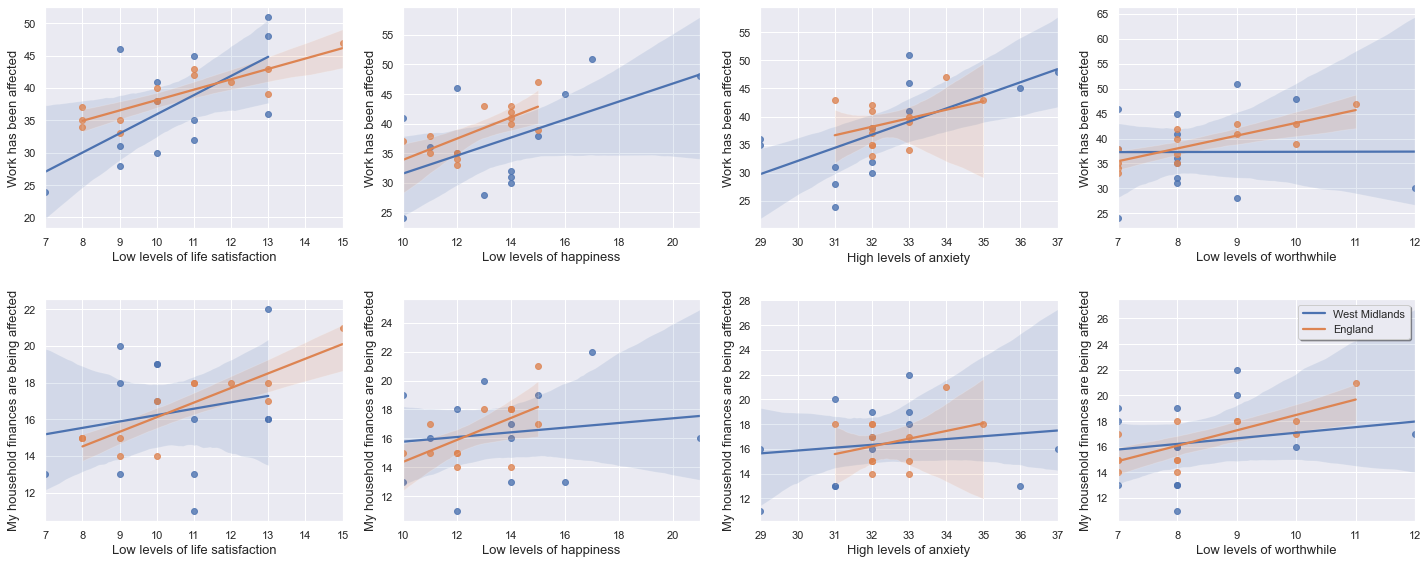The project aims to investigate the impact of the COVID-19 pandemic on health and well-being of adults (aged 16 years and over) living in West Midlands to support Birmingham City Council in meeting the needs of its citizens.
Research Team
- Diana Haidar
- Nora Hérault (ISIS Engineering School, INU Champollion, Castres, France)
- Abdel-Rahman H. Tawil
- Nigel Sharratt (Birmingham City Council)
- Konstantinos Vlachos
- Xavier Schmoor
Research background
The COVID-19 pandemic and the ensuing lockdown measures that were regularly updated since 23 March 2020 in the United Kingdom (UK), have had a detrimental impact on the physical and mental health and well-being of West Midlands' citizens. Indeed, dimensions of economic and social impacts of COVID-19 are likely to have an impact on the well-being of the population. There is substantial evidence that this pandemic will have long-term consequences on well-being, and it is important that local governments focus their efforts and resources on addressing these consequences for their citizens' best interest. This will further help councils to be more prepared for any ripple-effects resulting from the pandemic in the future.
Objectives
- Provide data-driven analysis to investigate the impact of the COVID-19 pandemic on health and well-being of adults (aged 16 years and over) living in West Midlands compared to that in England using Business Intelligence tools and strategies.
- Perform Linear Regression (LR) modelling and correlation analysis to examine the influence of COVID-19 economic and social factors on the well-being of West Midlands citizens.
- Understand how Birmingham City Council (BCC) should better target their services and resources.
Resources
In this project, we used the “Coronavirus and the Social Impacts on Great Britain” (CSI) survey data sets available from the Office for National Statistics (ONS) website. The CSI data is raw survey data of percentage or mean values of responses to questions including single-response and multiple-response questions with their associated Lower and Upper 95% Confidence Levels (LCL and UCL respectively). ONS has weekly releases covering the period from March 2020 to October 2021 and is broken down by age, sex, region, and country. In our study, we focused on the region `West Midlands' and the country `England' breakdowns.
The CSI data address different coronavirus impacts including health, well-being, economic, social, vaccine uptake and sentiment related questions, etc. The focus of this work is on selecting the health, well-being, economic, and social questions of interest to present the KPI metrics of our study for the period March 2020 – May 2021. The categories of metrics used include:
- Health and well-being metrics: levels of life satisfaction, worthwhile, happiness, and anxiety; worries about the effect of COVID-19 on their life; and their opinions about when life returns to normal
- Economic metrics: impact on work and household finances
- Social metrics: impact on relationships and caring responsibilities
Power BI dashboards/deliverables
Figure 1 presents the well-being levels of adults in West Midlands and England in percentages. We observed that the percentages that the Coronavirus was less and less affecting the adults' well-being in West Midlands and England. Indeed, all the well-being levels (worthwhile, satisfaction, happiness, anxiety) were improving from mid-February to mid-May, nevertheless, there was still a considerable percentage of anxious adults (approx. 30%).

Figure 1: well-being levels - Worthwhile, life satisfaction, happiness and anxiety (%).Low levels of life satisfaction, worthwhile, and happiness are defined as a score of 4 or below. High level of anxiety is defined as a score of 6-10.
Figure 2 shows the responses of citizens in West Midlands and England to the question, 'How long do you think it will be before life returns to normal?' Since 24 March 2021, the citizens in West Midlands and England became less optimistic than before, where the majority of responses were for More than a year.

Figure 2: Life returns to normal (%)
In order to understand the underlying relationships between the economic-social factors and well-being, we performed Linear Regression (LR) modelling as shown in Figure 3.We proved that there exist clear correlations between economic and social factors with well-being levels for England. For instance, in England, the LR lines fit the relationships with a high confidence except for High levels of anxiety. On the other hand, in West Midlands, the LR lines do not fit the relationships and the results are displayed with low confidence. We hypothesise that these correlations also apply for West Midlands, but it was not evident due to the limited data samples available for West Midlands and its fluctuations.

Figure 3: Linear Regression modelling for economic factors with regards to well-being metrics.
Publications
Haidar, D., Hérault, N., Tawil, A.R., Sharratt, N., Vlachos, K. and Vakaj, E., 2021, November. Health and Well-being Impact of Coronavirus: A Case study of West Midlands vs England. In 2021 IEEE/ACS 18th International Conference on Computer Systems and Applications (AICCSA) (pp. 1-6). IEEE. https://doi.org/10.1109/AICCSA53542.2021.9686891
